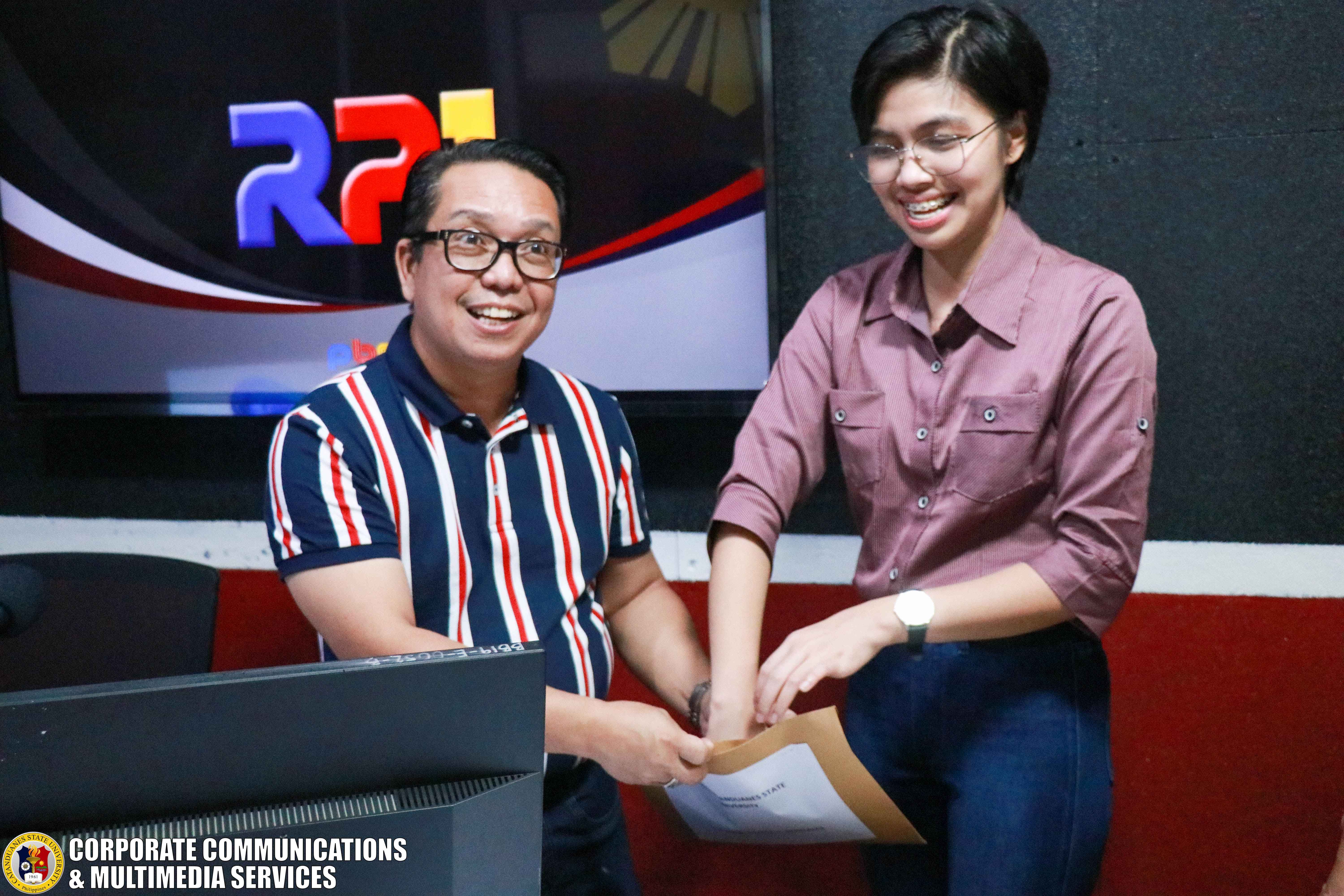
Master Plumbers Licensure Examination (MPLE) 6th Placer Engr. Divina V. Gonzales receives her P100,000 cash incentive and a certificate from Catanduanes State University (CatSU), through President Dr. Patrick Alain T. Azanza, along with Gonzales’ parents and Radyo Pilipinas - Catanduanes Station Manager Arlene O. Bagadiong today, August 7. “Dakulang tabang ini sa samong pamilya and para sa mga ma-take ning board exam mag-adal ning patanos para igwang balik,” Engr. Gonzales said in an interview at Radyo Pilipinas. Joining her daughter to receive the cash incentive, Vilma V. Gonzales, the mother of the topnotcher, extended her gratitude to the university and recognized the effort of Dr. Azanza as this was the first-time in the university’s history to grant a P100,000 cash incentive to a board topnotcher. “Gapasalamat ning dakula buda pareho ning aki, dae man ako makapaniwala sa inot na nag-topnotcher siya,” Engr. Gonzales’ mother shared.With a rating of 85.70%, Engr. Gonzales, 25, bested 5,107 other examinees and made it to the list of topnotchers as announced by the Professional Regulation Commission on July 19, 2023.
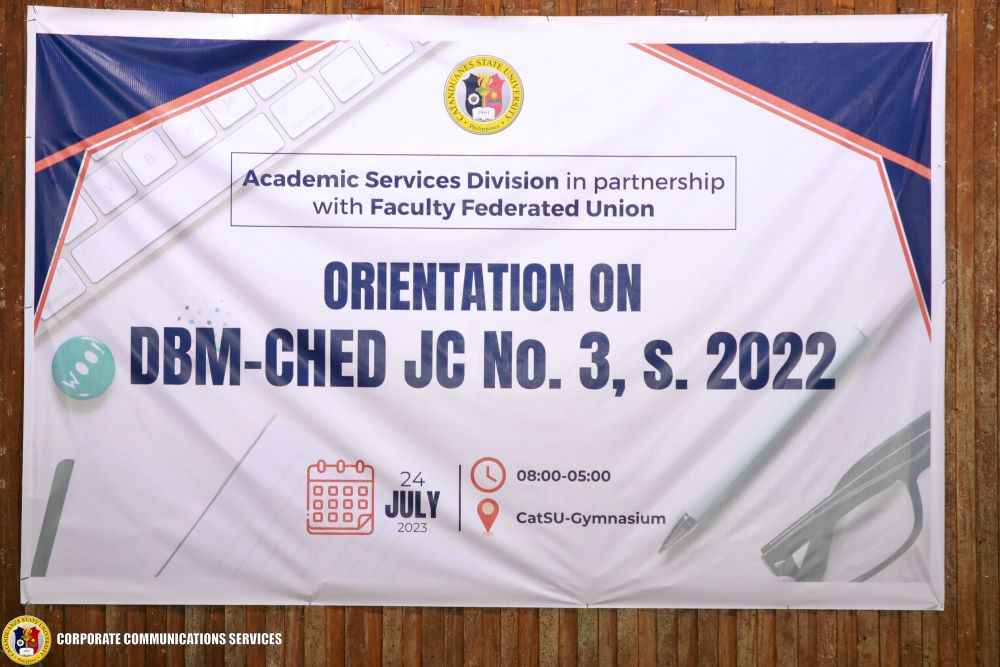
In accordance with the DBM-CHED Joint Circular No. 3, s. 2022, the Catanduanes State University, through its Academic Service Division spearheaded by the Office of the Vice President for Academic Affairs in partnership with the Federated Faculty Union, organized the Orientation on the Reclassification of Faculty Positions on Thursday, July 27, at the university gymnasium.Dr. Rosana S. Abundo, the faculty regent, gave an overview of the Guiding Principles for DBM CHED JC No. 3, s. 2022, which covered the point system for professor ranks, cycle evaluation, and merit promotion. She also presented the entirety of the Professional Certification process. Meanwhile, Prof. Moreno D. Tabios Jr., a faculty member from the Math Department of the College of Science, presented the Appreciation of Documentary Evidences required in the evaluation of faculty reclassification. Moreover, during the orientation proper, Prof. Tabios elaborated on the criteria and its supplemental guidelines that are grouped into four (4) Key Result Areas (KRAs), namely: (1) Instruction; (2) Research, Invention and Creative Work; (3) Extension; & (4) Professional Development. In the afternoon session, Dr. Gemma G. Acedeo, Vice President for Academic Affairs, discussed the summary of faculty position classification, its forms and applications. CatSU President Dr. Patrick Alain T. Azanza thanked the faculty members of both campuses for their enthusiasm and interest. The president shared the good news about the extension given by CHED as the deadline for submission, which is on August 15, and reminded the importance of being on time. He also encouraged all the College deans to assist their respective faculty members to be able to comply. After the orientation and workshop proper, an Open Forum followed which engaged the faculty members in a Q&A Session, and queries were addressed. Ms. Sionne May T. Crispino, the Head of Human Resources Management Services (HRMS), explained the flow of the evaluation procedure.Relatively, the DBM-CHED Joint Circular No. 3, s. 2022, entitled: “𝘎𝘶𝘪𝘥𝘦𝘭𝘪𝘯𝘦𝘴 𝘰𝘯 𝘵𝘩𝘦 𝘙𝘦𝘤𝘭𝘢𝘴𝘴𝘪𝘧𝘪𝘤𝘢𝘵𝘪𝘰𝘯 𝘰𝘧 𝘍𝘢𝘤𝘶𝘭𝘵𝘺 𝘗𝘰𝘴𝘪𝘵𝘪𝘰𝘯𝘴 𝘪𝘯 𝘚𝘵𝘢𝘵𝘦 𝘜𝘯𝘪𝘷𝘦𝘳𝘴𝘪𝘵𝘪𝘦𝘴 𝘢𝘯𝘥 𝘊𝘰𝘭𝘭𝘦𝘨𝘦𝘴 (𝘚𝘜𝘊𝘴),” aims to carry out the following objectives, to wit: (1) To provide an updated and revised policies and guidelines for the reclassification of faculty positions across SUCs; (2) To serve as the basis for policy decisions for faculty development in SUCs; and (3) To motivate a faculty to upgrade his/her rank and compensation by improving his/her academic qualifications, achievements, and performance.

Through the joint efforts between the Catanduanes State University (CatSU), University of the Philippines Los Baños (UPLB) and other stakeholders, various projects involving rice component, livestock/dairy, and AgroForestry were presented during the launching of the Panganiban Rural and Agricultural Development Project on June 28, 2023. Following the launching, Dr. Renato Vega from the International Rice Research Institute (IRRI) and a UP Los Baños professor, gave a lecture and distributed a sample of 20 rice varieties to the rice farmer-participants. Dr. Liborio S. Cabanilla, executive director of the UPLB College of Economics and Management Alumni Foundation, Inc. extended his gratitude to CatSU President Dr. Patrick Alain T. Azanza for accepting the invitation to implement the project at Panganiban Campus. “As the premier Agricultural Educational Institution in the community, CatSU is seen as a vital partner in achieving the project's objectives,” he expressed.Among the other stakeholder partners was the Panganiban Local Government Unit (LGU), and the partnership aims to drive sustainable rural and agricultural development in the island-province.The event featured presentations outlining the project components and delineating the specific responsibilities of each partner. Following a short program, the signing of a Memorandum of Understanding was held between the community stakeholders involved, symbolizing their strong commitment to the pursuit of empowering the local communities and paving the way for a vibrant agricultural sector in Panganiban.


Organized by the College of Industrial Technology (CIT) Dean, Dr. Edwin Romero, a playing coach himself, in collaboration with Catanduanes Lawn Tennis Club (CLTC), the clinic saw an impressive turnout of budding tennis enthusiasts and concluded with success during the awarding ceremony, August 3, 2023, at the new CatSU Sports Complex.The 2-week free lawn tennis clinic, which started on June 15, 2023, was joined by a total of 23 children and young adults in this event sponsored by the CLTC, with members based in different parts of the world.CLTC President, Ms. Francez Khu Camacho, said they selected the participants to provide them free training in basic tennis strokes, game scoring and ballboy basics.“This is part of our advocacies, to discover young tennis players with potential, and help them qualify in the basic training course, proceed to the advance course,” she remarked.Dean Romero echoed and shared that having such clinic sessions are an important way to test the players’ mettle after learning from instructors.“Ang pinaka goal po talaga is paramihin ang mga batang tenista sa Catanduanes, para hindi tayo maubusan ng supply ng mga tennis players sa isla na pwedeng ilaban sa mga competitions outside the province like Bicol Meet, SCUAA, Bicol Open, and even National tournaments.”CatSU president, Dr. Patrick Alain T. Azanza, whom the tennis clinic was named after, graced the event along with the participants’ parents. He was also joined by lawn tennis veteran player, Ms. Dirma T. Frias, and Dr. Rudy Tablizo, the University’s Sports Director.The event recognized the outstanding achievements of the young athletes across three brackets: Beginners A and B Tournament, and Advanced Tournament.Dexter Tel emerged as the champion in Beginners A, while Merrydel Ann Santos secured the top spot in Beginners B. In the Advanced Tournament, Liezle Gonzales demonstrated exceptional talent, claiming the title.In his message during the ceremony, Dr. Azanza commended the participants for their dedication and commitment to the sport.“What we need is not only mind, but a healthy body because overall, health is more than wealth. Being active into sports, is kadakulang bagay na mababalanse in order to have a holistic development – Better start it right, to put us in the right path.”Further, Dr. Azanza thanked all the sponsors, Dr. Stephen Bagadiong, and the parents for the full support and efforts, forward-looking for victories in the future sports events. “We look forward to the time to have champions not just in the region, but also at the national level,” the President said in closing.
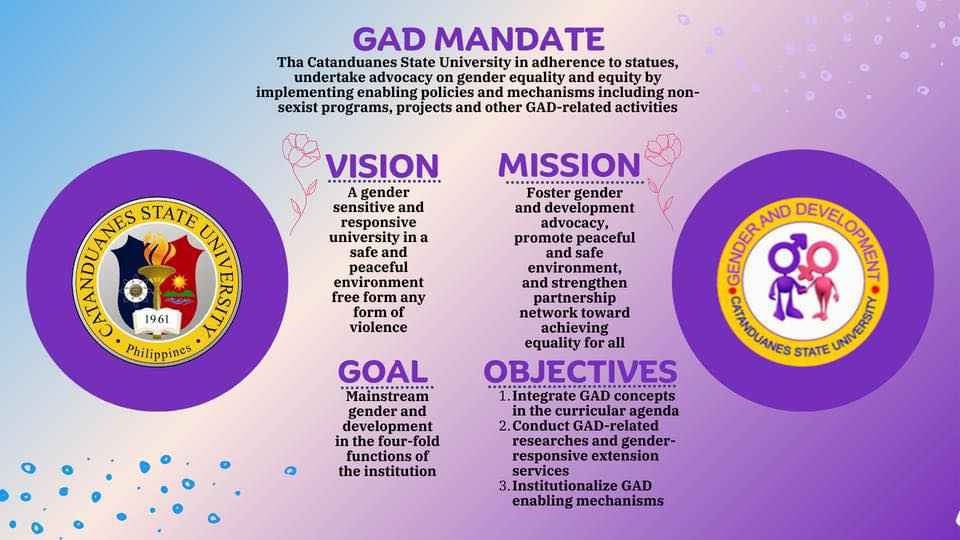
Virac, Catanduanes - The College of Industrial Technology (CIT), a historically male-dominated unit at Catanduanes State University (CatSU), has experienced a striking upward trajectory in female enrollment over the past six academic years. The figures, spanning from the AY 2017-2018 to 2022-2023, reveal a compelling story of expanding gender diversity. As far back as the AY 2017-2018, male students held a significant majority at 77.01% in CIT, with 536 male students compared to a mere 160 female students. However, over the subsequent years, the gender gap has consistently narrowed. Female enrollment increased to 24.21% in AY 2018-2019, rose further to 29.09% in AY 2019-2020, and reached an impressive 35.80% in AY 2020-2021. Although it slightly dipped to 30.96% in AY 2021-2022, the most recent school year recorded a female enrollment of 29.20% The turning point came in AY 2020-2021 when female enrollment surpassed 35%, totaling 397, while male enrollment stood at 712. This pivotal moment showcases the growing interest and confidence of young women in pursuing education in fields that were once perceived as predominantly male-centric. The upsurge in female enrollment can be attributed to several factors, including the University’s efforts to foster an inclusive and supportive environment for all students, irrespective of gender. Additionally, a rising awareness of gender equality in the province, along with the dismantling of traditional barriers in workplaces, has encouraged more women to express interest in fields that were historically male dominated. Dean Dr. Edwin T. Romero expressed delight at the changing demographics within the college, stating, “It’s wonderful to witness this positive shift in enrollment. We are committed to nurturing talent and providing equal opportunities for all our students. Seeing young women pursuing ladderized degrees in electronics, drafting, mechanical, and automotive technologies, as well as BS in Architecture, is not only a sign of progress but also an indicator of the bright future ahead.” As CIT continues to display improving gender diversity and inclusivity, “We hope to positively impact the campus culture. For instance, women are known to be detail-oriented, and I hope our male students can see the value in that. Likewise, our female students should not be afraid to embrace hands-on experiences to earn a living,” commented Gender and Development Focal Person Melinda Abichuela, emphasizing the importance of sharing skills between genders. CatSU President Patrick Alain T. Azanza is positive that this trend will continue and highlights the need for gender-responsive facilities. “The substantial increase in female enrollment in traditionally male-dominated colleges and vice versa expands opportunities for everyone. We are happy with this development, as it signifies equal representation of genders, empowerment of marginalized sectors, and the involvement of diverse ideas. In response to this emerging trend, we must prepare our facilities, such as providing more laboratories and automated machines that cater to the differences in physical characteristics of genders.” CatSU administration remains firmly committed to achieving gender equality, extending efforts to address gender gaps in other colleges like Engineering, Education, and Health Sciences. This remarkable surge in female enrollment at CIT reflects a positive shift towards greater gender equality in academia. As the University continues its dedication to fostering an inclusive and supportive environment, the hope is for this trend to spread across other disciplines, driving the transformation towards a more equitable and diverse academic landscape.Ms. Reashiela L. Khan GMMS Focal Person
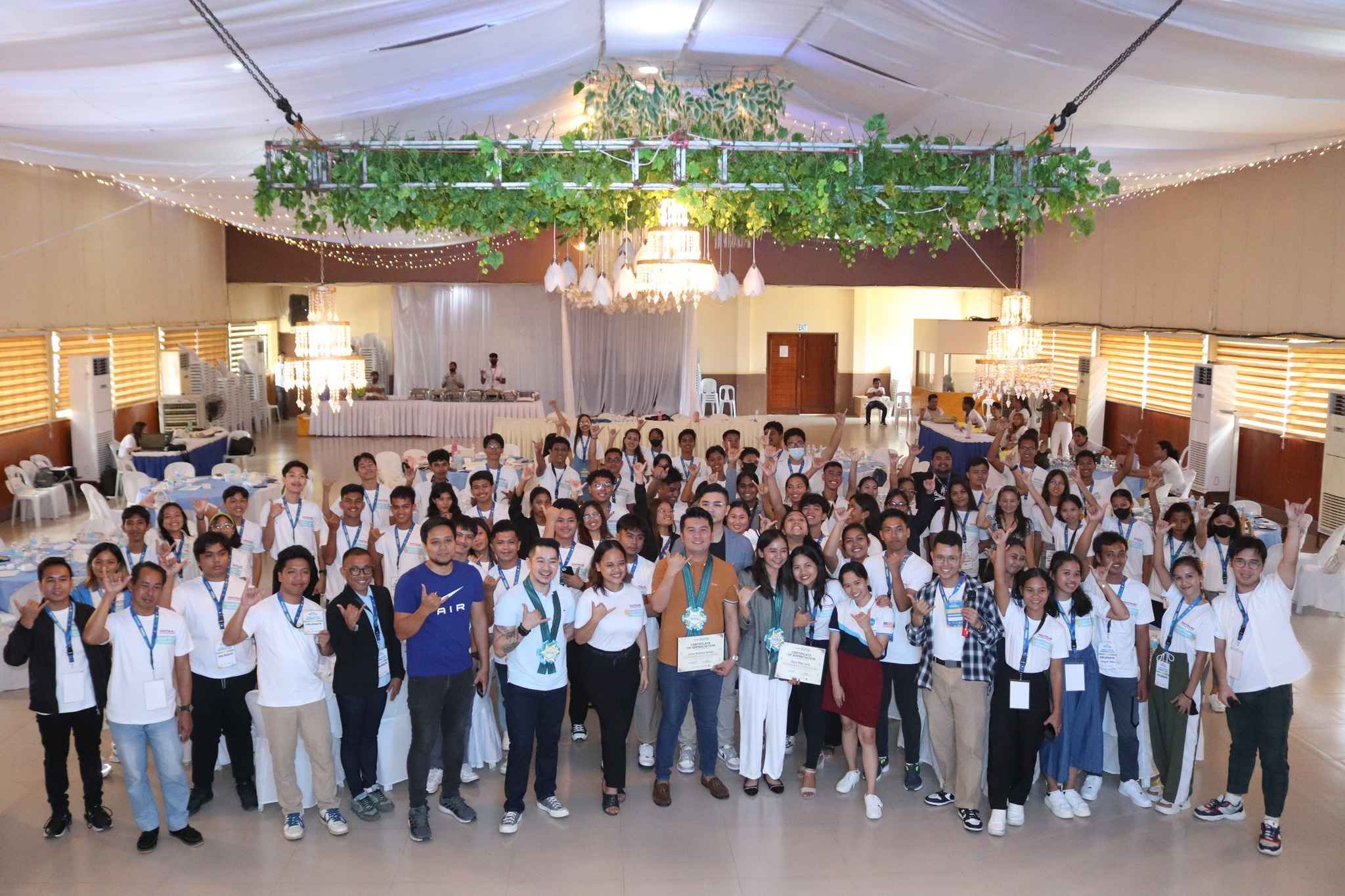
More than 60 Catandunganon youth leaders have come together at the Catanduanes State University (CatSU) Auditorium for the ‘Local Youth Assembly’ to exchange ideas, foster collaboration for civic engagement, and strengthen participation in Democratic Governance.Organized by Siklab Pilipinas, in collaboration with the Local Youth Development Office of Catanduanes, USAID, The Asia Foundation, CatSU, and other stakeholders, the one-day forum united a diverse group of passionate youth leaders from different organizations throughout the province. As a former youth leader himself, during his time as chairman of the University of the Philippines - Los Baños (UPLB) Student Council, Dr. Patrick Alain T. Azanza threw his full support to the activity and looked forward to the Catandunganon youths’ participation. “I hope that the youth from the island province of Catanduanes will actively participate in identifying and exemplifying the importance of youth leadership and civic engagement in addressing pressing community issues,” Dr. Azanza said in a video message on Tuesday, August 1. 𝗬𝗼𝘂𝘁𝗵 𝗮𝗿𝗲 𝗻𝗼𝘁 𝗽𝗮𝘀𝘀𝗶𝘃𝗲 𝗯𝘆𝘀𝘁𝗮𝗻𝗱𝗲𝗿𝘀As the keynote speaker in the kick-off ceremony of the activity, Gov. Joseph C. Cua, represented by Sangguniang Bayan Secretary Susan Isidoro, recognized the activity as a transformative platform that enables the Catandunganon youth to engage in youth-led initiatives. “Always remember, the youth are not passive bystanders; rather, you actively shape the world you desire,” the governor stated. Meanwhile, introducing the goal and objectives of YouthLed, Senior Youth Leadership Development Specialist Emil Tapnio discussed the various programs and activities of the organization, which involve leadership development, coalition-building, and civic education and engagement. Following the opening program, Gemar Moreno, the moderator, facilitated a discussion with the dynamic speakers: Legal Assistant Officer James Nathaniel Refugio, from Naga City Planning and Development Office, and Sagguniang Kabataan (SK) Federation President of Sipocot, Masbate Mary May Loria. 𝗦𝗲𝗿𝘃𝗲 𝗮𝗻𝗱 𝗹𝗶𝘃𝗲 𝗯𝗲𝘆𝗼𝗻𝗱Believing in the power of youth, Refugio urged the youth participants to challenge the status quo and be agents to solve the long-standing problems of their communities. “We are called to serve and live beyond,” he added.A series of focused-group discussions followed, which tackled on understanding the various issues in the community; sharing youths’ learning experiences; and the journey of an empowered community leader. Taking part also at the event were CatSU student affair’s newly appointed Director Francis John B. Templonuevo, who extended his gratitude to the organizer for taking the lead to empower young leaders in the province; Siklab Pilipinas Consultant Samantha Sadorra; National Youth Commission Commissioner Reena Pineda, who expressed her full support through a video message; and other YouthLed officials, together with the facilitators.

One hundred seventy-one (171) qualified students of Catanduanes State University (CatSU) attended the orientation for the Tulong Dunong Program - State University and College (TDP-SUC) on Wednesday, August 2, at the university auditorium, and were informed that they will receive a one-time scholarship grant worth P7,500 for the academic year 2023-2024. As cited by Office of Student Scholarship, Financial Assistance, Career Development and Placement Services (OSSFACDPS) Director Dr. Gemma M. Samas, the Php1.3 million worth of the locally funded scholarship program was made possible through the efforts of CatSU President Dr. Patrick Alain T. Azanza, who sought the support of Senate President Pro Tempore Loren Legarda for funding allocation.The OSSFACDPS director also underscored the importance of maintaining a 1.90 General Weighted Average (GWA) on the part of the scholars for their renewal, as stipulated under the program’s guidelines.To extend the program and serve more beneficiaries, Dr. Azanza will keep on seeking additional funding, and he shared that Sen. Legarda was committed to continuing the program in 2024. Addressing the TDP-SUC recipients, the CatSU president congratulated the deserving scholars and challenged them to do their part.“Maadal talaga ning marinas asin masakripisyo. Kung kamo mahiling ko na nakatapos, maogma ako, ta ibig sabihon successful ang programang ini na pinun’an sa time kan satuyang administrasyon,” Dr. Azanza advised, as he himself was also a pioneer recipient of presidential scholarship grant at the University of the Philippines from his undergraduate to post-graduate studies.Supporting the testament of the president, Vice President for Academic Affairs Dr. Gemma G. Acedo reminded the beneficiaries of their responsibilities to remain in the program.“Although may mga allowances tayo pero kailangan nating pagtrabahuhan para ma-maintain ang scholarship grant,” the VPAA said.Accepting the responsibility, Hazel Joyce Tornilla, an incoming third-year elementary education student from Panganiban campus, was grateful for the opportunity. “Nawalan na ako ng hope sa dami ng inapplyan na scholarship, pero unexpectedly nakapasok sa program na ito. Malaking tulong ito sa pag-aaral ko bilang anak ng isang PWD na ama at tanging kuya ko lamang ang nagpapaaral sa akin,” Tornilla shared at the event. Also joining the orientation was the university registrar, Marilyn G. Tejada, together with Prof. Ma. Sofia S. Llaguno, and Director Reashiela L. Khan of English Language and Speech Communication Services.
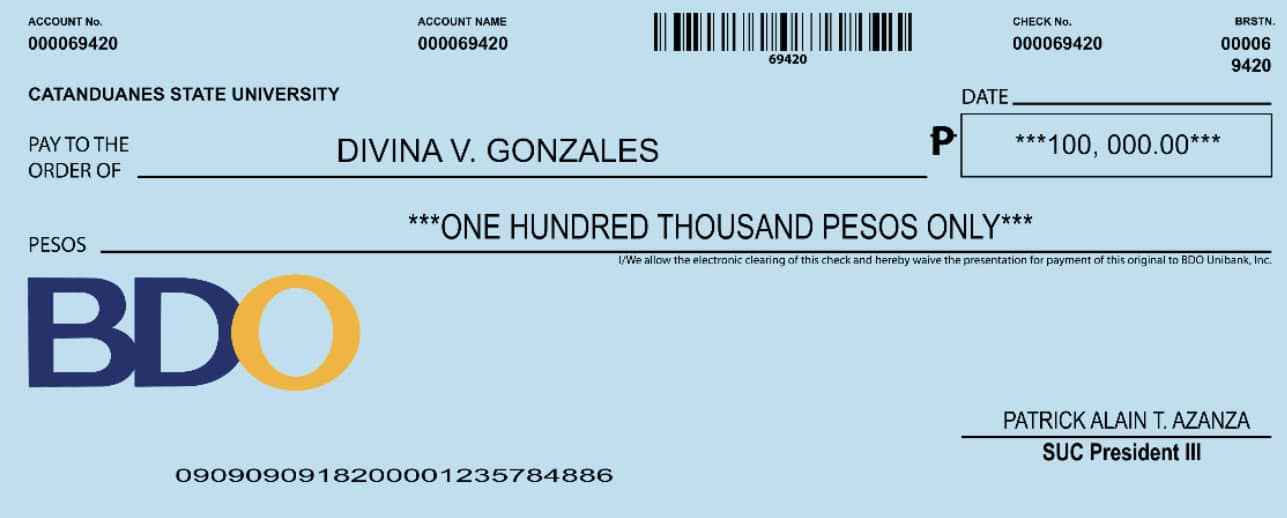
In recognition of her exemplary performance after securing the sixth spot in the July 2023 Master Plumbers Licensure Examination, Catanduanes State University, through President Dr. Patrick Alain T. Azanza, has announced to award a Php100,000 cash incentive to Engr. Divina V. Gonzales. With a rating of 85.70%, Engr. Gonzales, 25, is presently working as a structural engineer since 2021 in a private construction firm in Quezon City, bested 5,107 other examinees and made it to the list of topnotchers as announced by the Professional Regulation Commission on July 19, 2023. Engr. Gonzales has been a consistent achiever even during her elementary days, as she emerged as their class valedictorian and graduated later on under the Science and Technology Oriented Class (STOC) in high school.During her formative years in college, she became a representative of the university in various engineering quiz competitions and graduated as Cum Laude with a bachelor’s degree in civil engineering. After graduating in 2019, she took and passed the licensure examination for civil engineers with a remarkable rating of 89.35%, falling short of only two points to the Top 10 spot at the National level.

Catanduanes State University (CatSU) takes a significant step towards enhancing public service and community welfare with the adoption of its "Free Zone" policy. Spearheaded by CatSU SUC President III Dr. Patrick Alain T. Azanza, this policy fosters a collaborative approach to address people's problems and prioritize the community's benefit.President Azanza firmly believes that when leaders work together, solutions to people's issues become attainable, and the community becomes the primary beneficiary. In a heartfelt statement, he explained, "‘Yan ang dahilan kaya I adopted the policy for CatSU to serve as a Free Zone. Meaning bukas sana ang CatSU na magtabang sa gabos na gusto magtabang. Ta pag arog kita kaan, ang magana pirmi an mga tawo… That is what public service is all about…"The "Free Zone" policy aims to create an environment where CatSU is open to assisting anyone in need. The university seeks to contribute to the well-being of the entire community by actively addressing their concerns and offering support to those who require it the most.In line with this commitment, Congressman Leo Rodriguez has collaborated with the Department of Health (DOH) to address the medical expenses of CatSU students availing themselves of vital tests, such as the Complete Blood Count (CBC) and x-ray examinations. Through the Medical Assistance to Individuals Program (MAIP) Funds, facilitated by Congressman Leo, students can have their bills covered for essential medical procedures at partnering hospitals, including Immaculate Heart of Mary Hospital, Eastern Bicol Medical Center (EBMC), and Catanduanes Doctors Hospital Inc. (CDHI).

A groundbreaking initiative led by CatSU President Dr. Patrick Alain T. Azanza has brought together the Local Government Unit of Virac and the Catanduanes Medical Society to offer free Complete Blood Count (CBC) test and medical consultation services for all incoming first-year students of Catanduanes State University (CatSU). The program, which commenced on August 1, is set to run until August 4, providing much-needed medical support to students and their families.Dr. Azanza's vision is to establish strong partnerships with local governments, stakeholders, and Non-Governmental Organizations (NGOs) to address the financial burdens associated with the mandatory medical procedures required for enrollment. This initiative aims to ease the stress on students and their parents and ensure that every incoming student can pursue their academic journey without financial constraints."Our students' well-being is our utmost priority, and we are committed to creating an environment that fosters accessible education for all," emphasized Dr. Azanza. "By joining hands with the Local Government of Virac and the Catanduanes Medical Society, we strive to remove barriers to education and ensure that every incoming student can seamlessly pursue their academic journey without financial constraints."The event, which took place at Virac Plaza Rizal, has garnered significant attention and appreciation from the student community. As queues formed to take advantage of this opportunity, students expressed their gratitude for the university's dedication to their welfare."Dakulang tabang po sa mga estudyante na arog sako na hari sa simpleng pamilya ang free medical check-up," shared May Benavidez, an incoming CatSU BSND student, expressing her gratitude. Present during this event were Virac Mayor Samuel V. Laynes and Vice Mayor Arlynn H. Arcilla, who actively participated in the medical consultation service. VM Arcilla, being a doctor by profession, exemplified the spirit of community service, providing much-needed medical assistance to the students.This collaborative effort between CatSU, the Local Government of Virac, and the Catanduanes Medical Society marks a promising stride toward fostering a more inclusive educational experience for all incoming students.
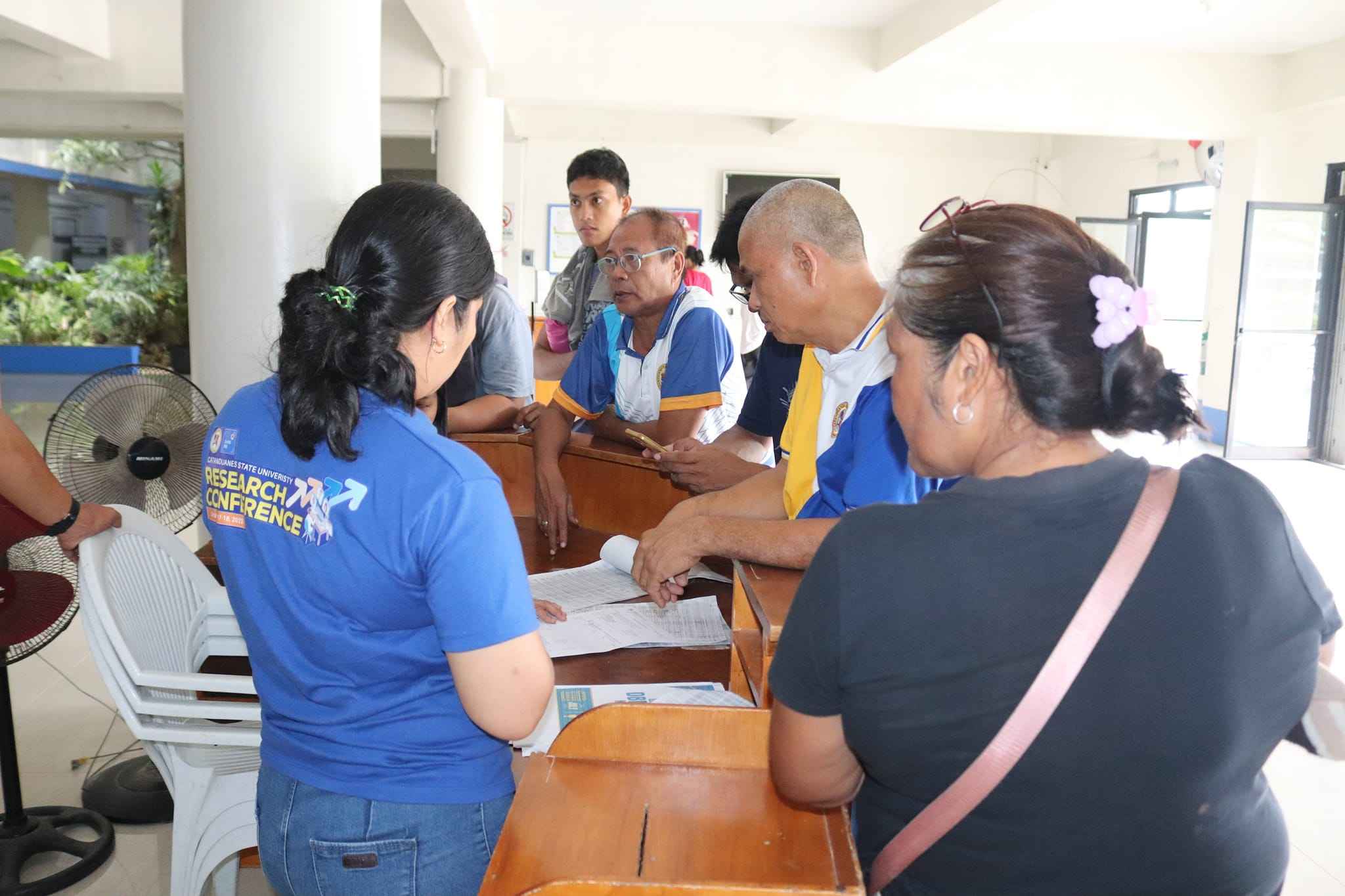
Through the mandate of President Ferdinand ‘Bongbong’ Marcos Jr., the Catanduanes State University started the distribution of the one-time 25-kilogram rice subsidy to the university’s 959 qualified employees on July 27–28, 2023.Under Administrative Order No. 2, signed by President Marcos last December 2022, the employees who are eligible to receive the rice aid are those who rendered government service as of November 30, 2022.As cited in the order, the initiative was meant to mitigate the effects of socio-economic challenges and boost domestic production of the Filipino farmers’ homegrown grains.Around 479 bags of rice from the National Food Authority (NFA) were delivered to the university. The 959 CatSU employees were among the 1,892,648 government workers, including Job Order (JO) and Contract of Service (COS) personnel, who benefited from the subsidy program.




